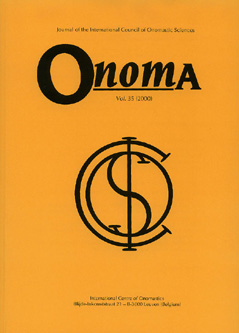 previous article in this issue previous article in this issue | next article in this issue  |

Preview first page |
Document Details : Title: Uniqueness in the Zulu Anthroponymic System Author(s): KOOPMAN, Adrian Journal: Onoma Volume: 44 Date: 2009 Pages: 69-91 DOI: 10.2143/ONO.44.0.2143402 Abstract : In many anthroponymic systems around the world, personal names are chosen from a limited onomasticon. In many countries, parents are obliged to choose children’s names from a limited Government-approved onomasticon. In other countries and in other cultures, parents are free to coin names in any manner whatsoever, and a high proportion of personal and other names are unique to the individual. Again, in many anthroponymic systems, 'name-sharing' is an important feature, with children being named after parents, grandparents and other kin. In other societies, name-sharing of this kind does not feature. This article looks briefly at the Zulu onomastic system as a whole, and then focuses on five categories of anthroponyms to see to what extent uniqueness is a feature, and whether or not name-sharing of any kind takes place. The five categories are: igama lasekhaya (‘home name’), igama lesilungu (‘colonial name’), isibongo (‘clan name’), isithakazelo (clan praise), and the nickname. In viele anthroponymischen Systemen in der Welt werden Personennamen aus einem beschränkten Onomastikon ausgewählt. In viele Ländern sind Eltern verpflichtet, die Namen für ihre Kinder aus einem limitierten, von der Regierung anerkannten Onomastikon auszuwählen. In anderen Ländern und Kulturen haben Eltern die Freiheit, Namen jeglicher Art ins Leben zu rufen, und ein hoher Anteil von Personen- und anderen Namen sind einmalig. Zudem ist das 'Teilen von Namen', z.B. wenn Kinder nach den Eltern, Großeltern und anderen Verwandten benannt werden, ein wichtiges Merkmal vieler anthronponymischer Systeme. Andere Gesellschaften hingegen weisen keine solche Art der gemeinsamen Benennung auf. Dieser Artikel betrachtet kurz das onomastische System der Zulu als Ganzes und konzentriert sich dann auf fünf Kategorien von Anthroponymen, um zu untersuchen, inwiefern das Teilen von Namen deren Merkmal ist, oder ob nicht das Teilen von Namen jeglicher Art stattfindet. Diese fünf Kategorien sind: igama lasekhaya ('Hausnamen'), igama lesilungu ('Kolonialnamen'), isibongo ('Clannamen'), isithakazelo ('Clanlobpreiseung') und der Spitzname. Dans beaucoup de systèmes anthroponymiques de par le monde, les noms personnels sont choisis à partir d’un onomasticon limité. Dans beaucoup de pays, les parents sont obligés de choisir les noms des enfants dans un onomasticon limité approuvé par le gouvernement. Dans d’autres pays et d’autres cultures, les parents sont libres de forger des noms de n’importe quelle manière et une forte proportion de noms de personnes et d’autres noms sont propres à chaque individu. Encore une fois, dans beaucoup de systèmes anthroponymiques, le 'nom en partage' est une caractéristique importante, les enfants étant appelés comme les parents, les grands-parents et d’autres membres de la famille. Dans d’autres sociétés, le fait de partager le nom de cette sorte est absent. Cet article examine brièvement le système onomastique zoulou dans son ensemble et se concentre ensuite sur cinq catégories d’anthroponymes pour voir dans quelle mesure l’unicité est une caractéristique et si, oui ou non, le 'nom en partage', quel qu’il soit, est usité. Les cinq catégories sont: igama lasekhaya ('nom de maison'), igama lesilungu ('nom colonial'), isibongo ('nom de clan'), isithakazelo ('louange du clan') et le surnom. |
|


